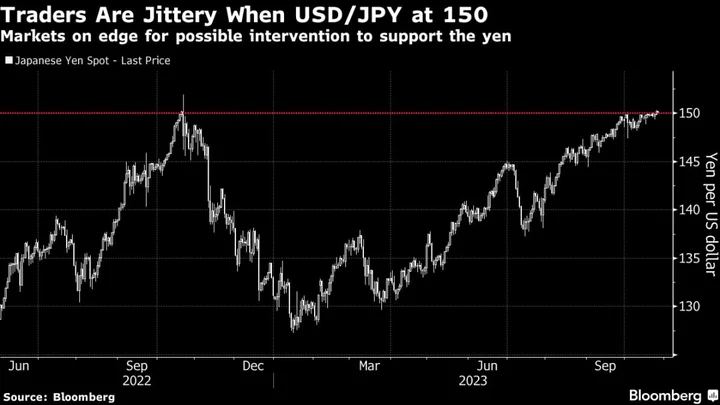Asian stocks are set for a mixed open as US shares slumped following a batch of poor corporate earnings, while currency traders will remain on edge after the yen fell to a 33-year low. Oil surged back above $85 a barrel.
Equity futures pointed to early losses in Australia and Japan. The tech-heavy Nasdaq 100 index slid 2.5%, weighed by Google’s parent Alphabet Inc.’s disappointing cloud figures and Texas Instruments Inc.’s bearish forecasts. Contracts in China and Hong Kong point to early gains a day after Beijing unveiled more measures to stimulate the economy. The Golden Dragon index, a gauge of Chinese shares in the US, slumped over 2%.
Treasury yields surged Wednesday after poor demand for a sale of five-year notes deepened anxiety about auction size increases expected to be announced next week. Yields were already rising before the auction, reinforced by stronger-than-expected September new home sales data. The yield on Australian 10-year bonds climbed ten basis points in early trading, following its US counterpart’s 13 basis point jump to 4.95%.
“The most important number out there is that 10-year yield,” Marvin Loh, Senior Global Macro Strategist at State Street said on Bloomberg Television. “And that 10-year yield is unanchored right now.”
Currency traders will remain on alert after the rise in Treasury yields pushed the Japanese yen to close at 150.23 per dollar on Wednesday, the weakest since August 1990. The move increases the risk of intervention from the authorities in Tokyo, who have repeatedly said they wouldn’t rule out any options to curb against the excessive moves.
Wall Street grappling with a batch of corporate earnings sent stocks lower on Wednesday amid heightened Treasury volatility, with traders also keeping an eye on the latest geopolitical developments. President Joe Biden said he had asked Israel to delay an invasion of Gaza so that more hostages held by Hamas can be freed. Contracts on US equities fell in early Asian trading.
“The question now turns to earnings as earnings drive stock prices,” said Howard Ward, chief investment officer of Growth Equities and portfolio manager at Gabelli Funds. “This is where the rubber meets the road. A recession would result in higher unemployment, less consumer spending, slower gross domestic product growth and lower earnings, which implies lower stock prices.”
Longer-dated US yields outpaced those in shorter-maturity bonds — a process known as “bear steepening.”
Economists often look to the Treasury market for clues about when a recession might come. Specifically, they examine the so-called yield curve. When it’s “inverted,” as it has been since about mid-2022, that almost always means a recession is looming. But by mid-2023, the curve began to “disinvert” – or steepen in industry parlance — in a way that raised the question of whether the US had managed to dodge a recession or whether one was about to start.
Read: ‘Pretty Big’ Knife Keeps Falling Into Bond Market: Surveillance
Elsewhere, oil topped $85 a barrel while gold remained near $1,980 an ounce.
Corporate Highlights:
- Boeing Co. maintained its cash-flow target and said it’s moving ahead with higher aircraft output, reassuring investors even as manufacturing defects forced the company to lower its annual delivery goal for the top-selling 737 model.
- Apple Inc. raised prices of its Apple TV+, Arcade gaming and News+ subscription services on Wednesday, in a move that could generate more revenue for its increasingly key services division.
- It’s also planning an end-to-end overhaul of its AirPods lineup, refreshing a product category that’s emerged as one of the company’s biggest sellers.
- Visa Inc. and Mastercard Inc. are facing a new round of regulatory challenges, with the Federal Reserve proposing lower caps on the fees banks and payment companies can charge merchants when consumers swipe their debit cards at checkout.
- T-Mobile US Inc. posted third-quarter profits that beat estimates, buoyed by better-than-expected mobile customer gains.
- Short-seller Carson Block said he’s shorting Sunrun Inc. again, part of a short theme he calls the “ESG hustle.”
- Sunrun says it fully stands behind its reporting of metrics, including subscribers, in response to the short report from Muddy Waters released earlier Wednesday.
- Deutsche Bank AG said it will accelerate payouts to shareholders, seeking to lift the lender’s stock and close a valuation gap with peers. It’s also starting another round of job cuts.
- Worldline SA sent a fresh shockwave through Europe’s fintech sector on Wednesday, cutting its sales outlook and warning of economic challenges that pushed its stock down by more than half.
Key events this week:
- European Central Bank interest rate decision; President Christine Lagarde holds news conference, Thursday
- US wholesale inventories, GDP, US durable goods, initial jobless claims, pending home sales, Thursday
- Intel, Amazon earnings, Thursday
- China industrial profits, Friday
- Japan Tokyo CPI, Friday
- US PCE deflator, personal spending and income, University of Michigan consumer sentiment, Friday
- Exxon Mobil earnings, Friday
Some of the main moves in markets:
Stocks
- S&P 500 futures fell 0.4% as of 7:36 a.m. Tokyo time, the S&P 500 index fell 1.4%
- The Nasdaq 100 fell 2.5%
- Hang Seng futures rose 0.2%
- S&P/ASX 200 futures fell 0.3%
Currencies
- The Bloomberg Dollar Spot Index was little changed
- The euro was unchanged at $1.0566
- The Japanese yen was little changed at 150.11 per dollar
- The offshore yuan was little changed at 7.3308 per dollar
- The Australian dollar fell 0.3% to $0.6290
Cryptocurrencies
- Bitcoin was little changed at $34,655.35
- Ether rose 0.3% to $1,793.57
Bonds
- Australia’s 10-year yield advanced nine basis points to 4.80%
Commodities
- West Texas Intermediate crude fell 0.1% to $85.28 a barrel
- Spot gold rose 0.1% to $1,981.85 an ounce
This story was produced with the assistance of Bloomberg Automation.

